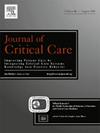Reversal of antithrombotics in the critically ill: An international online survey
IF 2.9
3区 医学
Q2 CRITICAL CARE MEDICINE
引用次数: 0
Abstract
Purpose
Critically ill patients face an increased risk of both thrombotic and bleeding complications, necessitating careful administration of antithrombotic agents such as platelet aggregation inhibitors (PAI), anticoagulants and fibrinolytics for prophylactic and therapeutic purposes, but also posing challenges for reversal strategies. This survey aims to assess the current clinical practice of reversal of antithrombotics in the intensive care unit (ICU).
Methods
An international online 79-item survey was performed among critical care physicians. The survey was disseminated via multiple intensive care societies. Reversal practices for PAI, vitamin K antagonists (VKA), heparins, factor Xa inhibitors, direct thrombin inhibitors (DTI) and fibrinolytics were surveyed.
Results
From June 2023 to January 2024, 477 participants started the survey, with 208 completed surveys from 49 countries. The majority (79 %) of respondents practiced ICU medicine in Europe. Only 17 % of the included participants indicated the presence of an ICU-specific antithrombotic reversal protocol in their hospital. Of those, specific protocols were present for 92 % for reversal of VKA, 75 % for unfractioned heparin, 58 % for low-molecular-weight heparin, 53 % for factor Xa inhibitors, 50 % for PAI, 44 % for DTI and 31 % for fibrinolytics. There was heterogeneity in reported reversal practice for different antithrombotics in specific scenarios and between continents. However, dosing strategies of applicable reversal agents were similar.
Conclusion
This survey shows variability in the reported clinical approaches to reverse antithrombotic agents in the ICU. The majority of hospitals included do not have a specific protocol for antithrombotic agents reversal emphasizing the need for ICU specific guidelines.
危重患者抗血栓逆转:一项国际在线调查
危重患者面临血栓和出血并发症的风险增加,需要谨慎使用抗血栓药物,如血小板聚集抑制剂(PAI)、抗凝剂和纤溶剂,以达到预防和治疗目的,但也对逆转策略提出了挑战。本调查旨在评估目前在重症监护病房(ICU)逆转抗血栓药物的临床实践。方法对重症医师进行国际在线79项调查。该调查通过多个重症监护协会进行了传播。调查了PAI、维生素K拮抗剂(VKA)、肝素、Xa因子抑制剂、直接凝血酶抑制剂(DTI)和纤溶剂的逆转实践。从2023年6月到2024年1月,共有477名参与者开始调查,完成了来自49个国家的208项调查。大多数(79%)受访者在欧洲从事重症监护医学。只有17%的参与者表示在他们的医院有icu专用的抗血栓逆转方案。其中,有92%的VKA逆转方案、75%的未分离肝素方案、58%的低分子肝素方案、53%的Xa因子抑制剂方案、50%的PAI方案、44%的DTI方案和31%的纤溶药物方案。不同抗凝药物在特定情况下和不同大陆间的逆转实践报告存在异质性。然而,适用的逆转药物的给药策略是相似的。结论:该调查显示,在ICU中,报告的临床使用抗血栓药物的方法存在差异。纳入的大多数医院没有抗血栓药物逆转的具体方案,强调需要ICU的具体指南。
本文章由计算机程序翻译,如有差异,请以英文原文为准。
求助全文
约1分钟内获得全文
求助全文
来源期刊

Journal of critical care
医学-危重病医学
CiteScore
8.60
自引率
2.70%
发文量
237
审稿时长
23 days
期刊介绍:
The Journal of Critical Care, the official publication of the World Federation of Societies of Intensive and Critical Care Medicine (WFSICCM), is a leading international, peer-reviewed journal providing original research, review articles, tutorials, and invited articles for physicians and allied health professionals involved in treating the critically ill. The Journal aims to improve patient care by furthering understanding of health systems research and its integration into clinical practice.
The Journal will include articles which discuss:
All aspects of health services research in critical care
System based practice in anesthesiology, perioperative and critical care medicine
The interface between anesthesiology, critical care medicine and pain
Integrating intraoperative management in preparation for postoperative critical care management and recovery
Optimizing patient management, i.e., exploring the interface between evidence-based principles or clinical insight into management and care of complex patients
The team approach in the OR and ICU
System-based research
Medical ethics
Technology in medicine
Seminars discussing current, state of the art, and sometimes controversial topics in anesthesiology, critical care medicine, and professional education
Residency Education.
 求助内容:
求助内容: 应助结果提醒方式:
应助结果提醒方式:


